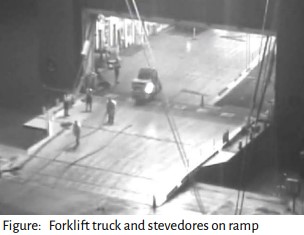Safety Alert: Stevedore struck by forklift on passenger ferry stern ramp
A stevedore suffered a fractured leg after being run over by a forklift truck on the stern ramp of a ro-ro ferry in an incident with potential for even more severe consequences.
The ferry’s staff were responsible for simultaneously supervising the offloading of cars and palletised cargo, which was undertaken using forklift trucks driven by stevedores. After the cars had been offloaded the crew prepared to back load excavators onto the ro-ro’s deck, a process that required the positioning of lengths of heavy rope on the stern ramp. At the same time as two stevedores lifted the first length of rope and were moving it across the centre of the stern ramp, a forklift truck with a pallet of slate was being driven off the ferry.
The forklift truck driver did not see the stevedores on the stern ramp. The stevedore nearest to the approaching forklift truck was standing with their back to the ferry and did not see the oncoming forklift truck. The forklift truck driver was wearing ear defenders and did not hear a shouted warning from the crew in time to prevent the forklift truck striking the stevedore on the leg, causing multiple fractures.
MAIB concludes that the accident was both foreseeable and preventable given the frequency of accidents involving pedestrians and vehicles on vessel stern ramps.
The Lessons
1. Hazard → pedestrian and vehicular work was not segregated. The forklift operator’s line of sight was obscured by the palletised load on the forks. The stevedores had become accustomed to working near moving vehicles. The strategy of see and be seen, with the onus on pedestrians to keep out of the way, was flawed. Industry codes of practice require that pedestrians and vehicles remain segregated by appropriate means.
2. Procedure → A system of control should have been established to effectively segregate pedestrian workers from vehicles or to prevent pedestrians working on the stern ramp during loading and discharge operations.
3. Communicate → It is essential that those who supervise and manage these activities work together to identify and resolve conflicts between each other’s documented safety management systems.
For the incident details see page 14 of: https://www.gov.uk/government/news/maib-safety-digest-22023-published
ICHCA International is committed to helping industry to learn lessons fast, learn them once and make sure that they stay learnt. This information is intended to provide all organisations in the cargo supply chain with the opportunity to consider the events and to review and adapt their own health and safety control measures to proactively prevent future incidents.
We are grateful to the MAIB for providing details and for raising awareness. We acknowledge their commitment to sharing learning to benefit others. If you have similar operations, please share this information with managers, operatives and any potentially affected third parties as appropriate. Please also review any of your relevant operations for similar hazardous conditions, risks, and controls. Learning content like this is highly valuable as it is based on real-world experience. We encourage everyone with publishable information about incidents to send it to us, so that we can raise awareness across the whole industry. Please contact us at secretariat@ichca.com; sharing your insight could save a life or prevent injury.


